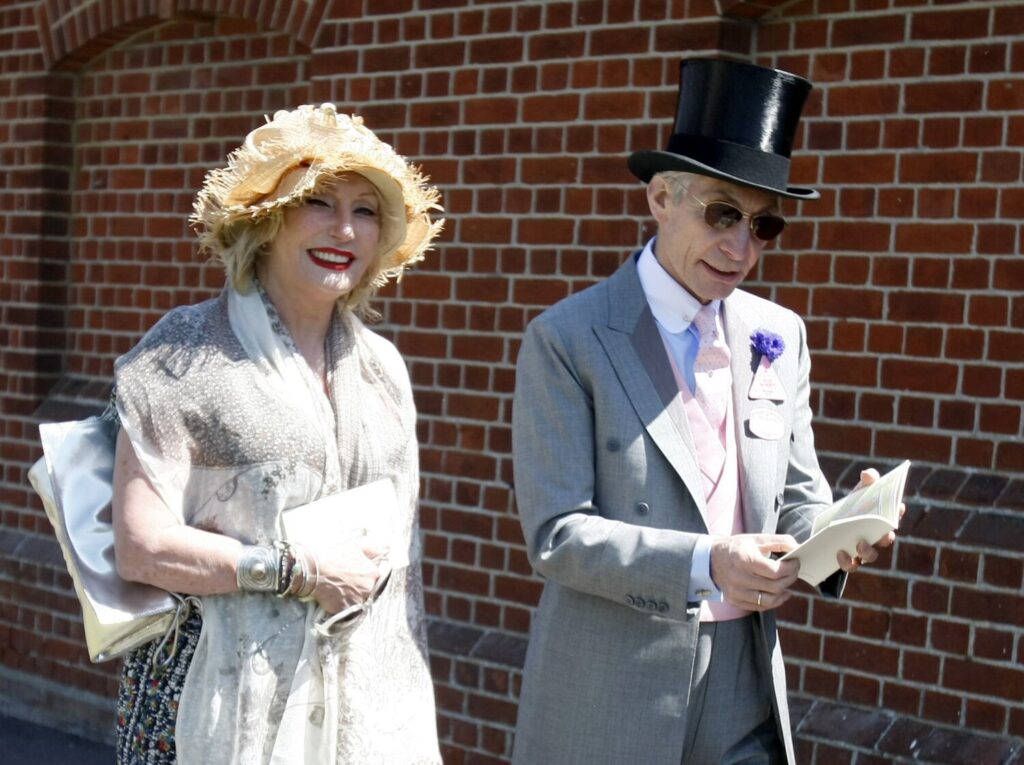Shirley Ann Watts, a former art student and prominent breeder of Arabian horses who met drummer Charlie Watts well before he joined the Rolling Stones and with him formed one of rock’s most enduring marriages, has died at 84.
Her family announced that she died Friday in Devon, England, after a brief illness. Rolling Stones guitarist Ronnie Wood was among those who mourned her.
“We will miss you so much, but take comfort that you are reunited with your beloved Charlie,” Wood wrote on Facebook.
While Wood, Mick Jagger and Keith Richards all have had multiple wives and girlfriends, Charlie and Shirley Watts remained together for more than half a century, until Charlie’s death in 2021. Their only known crisis happened in the mid-1980s, when Charlie Watts struggled with heroin addiction, a time he would later say nearly cost him his marriage. He was otherwise regarded as so devoted to his wife, and daughter Seraphina, that journalists essentially left him alone.
“I’ve always wanted to be a drummer [and] as long as it’s comfortable with my wife, I’ll continue to do it,” he told Rolling Stone magazine in 1996.
When Charlie wasn’t touring or recording, he and his family lived on a 600-acre, 16th century estate in Devon, where they were better known for their Polish Arabian horses and for rescuing animals than for the drummer’s singular place in rock history. Stories about the Wattses were as likely to appear in Arabian Horse World as they were in a music publication.
According to Charlie, his wife had warm relations with Jagger and Richards and, unlike him, would play the Stones’ music around the house. But Shirley also expressed ambivalent feelings about the famous group her husband played in, telling Vanity Fair in 1989 that the band’s drug use affected her life “very, very deeply” and that in general she had little use for the rock star world.
“It was quite appalling being pitched into the life of the Rolling Stones,” she said. “I really got lost for about 25 years and I’ve never been able to cope with it. There’s been lots of anger, much of it very, very deep. I like the people in the group — up to a point. But I’ve always hated the way rock music and its world treat women and particularly the Rolling Stones’ attitude. There is no respect.”
Shirley Ann Shepherd was born in London in 1938 and was studying sculpture at the Royal College of Art in the early 1960s when she first saw her future husband, who at the time was part of the emerging blues and jazz scene in England. They were already dating when Watts joined the Stones early in 1963 and married the following year, just as the band established itself as second only to the Beatles in local popularity.
“She was so funny and clever, and she had the most infectious laugh you’d ever heard,” Charlie Watts told the Guardian in 2000. “And I loved the world she was in, the world of art and sculpting. I just admired Shirley very, very much.”
The biggest scandal about their marriage was probably their decision to get married. Rock star weddings were considered bad business at the time, a turnoff to young female fans — the Beatles’ John Lennon was among those who hedged when reporters asked him about his domestic life.
Without informing the other Stones, the Wattses married in Bradford and had a quiet lunch at a nearby pub in lieu of a formal reception. According to Paul Sexton’s “Charlie’s Good Tonight,” a 2022 biography of the late drummer written with his family’s cooperation, Charlie Watts initially denied reports that he was married, telling the Daily Express that “it would do a great deal of harm to my career if the story got around.” But Shirley happily confirmed the news, saying they could not “bear to live separately any longer.”
Neither Charlie nor Shirley liked drawing attention to themselves, but at times they did. Shirley Watts was arrested in 1971 at the Nice airport in France for attacking customs officials after they reportedly singled out her husband for attention. In 2016, she threatened to sue Polish government officials over the alleged mistreatment of two Arabian mares at a state-run farm.
Shirley Watts also endured a battle with alcoholism, one she said she overcame partly by spending hours sculpting horses and dogs. The Wattses’ shared interest in horses grew from collecting figurines to raising hundreds of Arabian horses, a passion that began after Charlie purchased a part-bred stallion for his wife.
“I much prefer my life here with the horses. I love the hunt. The sense of power one gets on a horse,” she told Vanity Fair. “It’s a very primeval instinct. When you hear the hounds — they call it the music — when you hear the hounds’ music, it’s bloodcurdling, it’s so thrilling. And it affects both you and the horse. There’s nothing like it. It’s dangerous. It’s exciting.”
She added, with a laugh, “It sounds rather like a rock ’n’ roll concert.”

